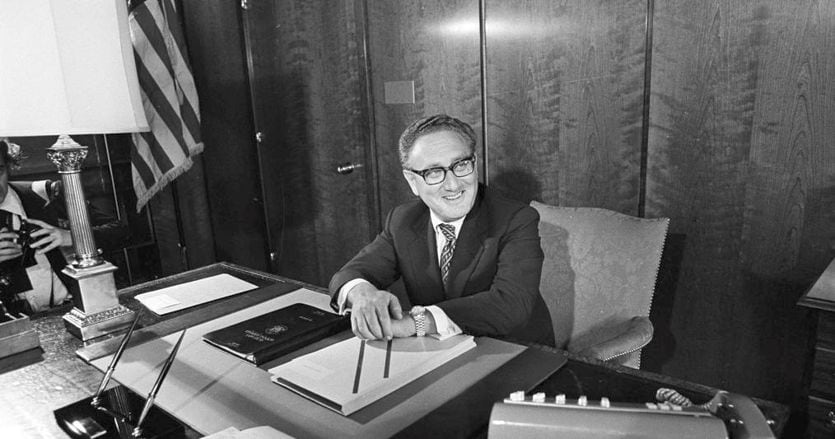Refugee in the United States from his native Germany
Born in 1923 as “Heinz” Kissinger in Fürth (city in northern Bavaria) into a German Jewish family, he will leave Germany with his parents in 1938 to escape the anti-Semitic persecutions of the Nazis, finding refuge first in London and then in the United States. where he will change the name to Henry. He also worked as a laborer in order to continue his studies, but with the arrival of the war, in 1943 (together with his brother Walter) he enlisted in the United States army and was hired as a German translator and interpreter, acquiring American citizenship. After the war, in 1947 he applied for admission to Harvard University and his application was accepted. Another period of his life began for him at the age of 24.
A few weeks ago, as the anniversary of the “centenary” was near, Kissinger granted an extensive interview to the American television network Cbs and received correspondents from the British weekly “The Economist” conversing with them for eight hours over two days. The comparison with another great American diplomat and essayist of the post-war period, George Kennan (born in 1904 and passed away in 2005 at the ripe old age of 101), naturally arises. Charge d’affaires in Moscow and expert on Soviet matters, as well as a fine analyst, on February 22, 1946 Kennan sent Washington the “long telegram” (8,000 words), which in the Cold War would become the basis of the American “containment” policy of dreaded Soviet expansionism; in the following years Kennan will become a convinced supporter of US-USSR détente.
USA and China: less than 10 years to avoid total confrontation
According to Henry Kissinger, the United States and China have only five to ten years to avoid World War III. Instead of the pairing of Washington with Moscow, the fate of humanity now depends on the one with Beijing: “The most urgent test, where the capacity for coexistence between the two major powers can be seen, is the question of Taiwan”, so we read in “The Economist”, which resumed the conversation in the issue dated 20-26 May. “Today we are on the path of confrontation between great powers, where both think that the other represents a danger, not only at a military level, but also and above all at an economic and technological level”. A classic pre-war situation, where neither side has much room for political concessions and where any disturbance of the balance can lead to catastrophic consequences. “If after the Thirty Years’ War, Napoleon’s wars and the Second World War the progress of humanity resumed, this time, with nuclear weapons, it would no longer be the case”.
From artificial intelligence a possible threat
But the United States and China must find ways to coexist. There was enmity and hostility in the United States during Nixon’s presidency, but there was still some degree of unity in the nation, whereas now Trump and Biden have gone over the top. For Kissinger, in addition to the nuclear threat, there is the danger of a technological war, destructive due to the improper use of tools such as artificial intelligence. A real obsession for him, to the point of making him imagine global plagues or other pandemics, hence the absolute need for responsible leaders. Kissinger recounts that when he accompanied Nixon on his first visit to China in February 1972, only Mao Zedong had the authority to negotiate on Taiwan, but when Nixon raised the subject with him, Mao said: “I am a philosopher, I do not deal with these topics ». Instead, it was Prime Minister Zhou Enlai who spoke to Kissinger about Taiwan: «They are a brigade of counter-revolutionaries, now we don’t need them. Maybe one day, who knows. But there is time, we can wait a hundred years.’
The status quo of February 24, 2022
Kissinger also spoke of Ukraine with a surprising proposal: the first step to avoid disasters, especially in Europe, is to have Kiev join NATO. Kissinger praised the Ukrainian president Zelensky, while «what the Europeans are saying is dangerous, as they claim they don’t want Ukraine in the Atlantic Alliance, because such a scenario would be too great a risk of an open confrontation with Russia. We are sending the most advanced weapons to the Ukrainians, but we shouldn’t end the war the wrong way.” Assuming that the most likely outcome should lead us to the status quo that existed before the Russian invasion on February 24, 2022, the goal should be for Ukraine to remain protected by Europe and not become a solitary state looking out for itself . «If I spoke to Russian President Putin, I would tell him that he too would be safer with Ukraine in NATO. If the war ends, as it may, with Russia losing most of its battle gains, but retaining the Sevastopol base in the Crimea, we may have a dissatisfied Russia, but also a dissatisfied Ukraine. Therefore “for European security, it is better to have Ukraine in NATO, where it could not take decisions on its own regarding territorial claims”.
